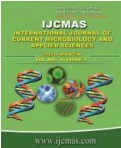


 National Academy of Agricultural Sciences (NAAS)
National Academy of Agricultural Sciences (NAAS)

|
PRINT ISSN : 2319-7692
Online ISSN : 2319-7706 Issues : 12 per year Publisher : Excellent Publishers Email : editorijcmas@gmail.com / submit@ijcmas.com Editor-in-chief: Dr.M.Prakash Index Copernicus ICV 2018: 95.39 NAAS RATING 2020: 5.38 |
The present investigation was carried out to standardize and evaluate plain, probiotic, prebiotic and synbiotic yoghurts using selected yoghurt commercial starter culture, probiotic cultures (L. acidophilus, L. casei, L. plantarum, and L. rhamnosus), and prebiotic fibre sources viz., oat flour, inulin and banana flour. Based on the acceptance of the product from the sensory point of view, the overall acceptability score for plain and probiotic yoghurt prepared with 2 % inoculation was higher than 1 % inoculation. Prebiotic yoghurt prepared with 0.5% oat flour, 1.0% inulin and 1.5% banana flour obtained higher scores when compared to the other prebiotic samples. Synbiotic yoghurt developed with 0.5% oat flour scored highest values among the other oat flour added samples. Synbiotic yoghurt developed with 1.0% inulin scored maximum values than other inulin added samples. Synbiotic yoghurt developed with 1.5% banana flour scored more values than the other banana flour added samples. The pH of the yoghurt samples was ranged from 3.20 to 3.41, total solid content 8.54 to 8.79 %, protein content 3.51 to 3.78 % and fat content 3.01 to 3.07 % in all the yoghurt samples. The viability of probiotics and total bacterial population was found to be highest in the treatment of T10 (Yoghurt commercial starter culture- 1 % + L. rhamnosus- 1 %+ 0.5 % oat flour). Growth of probiotic bacteria have been shown to be enhanced with prebiotics. It was found that till the end of storage there was no yeast and mold growth in the dilution factors 10-1 and 10-2. Hence it may be inferred that the prepared yoghurts can be deemed fit for storage up to 21 days at 4°C.
 |
 |
 |
 |
 |